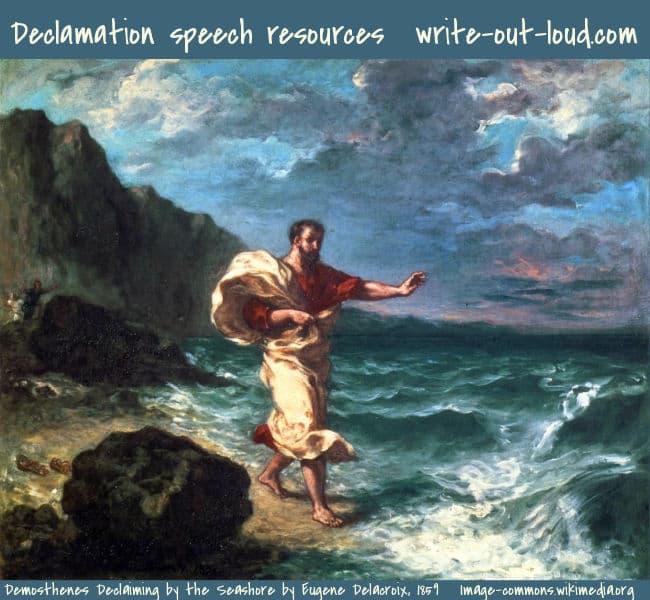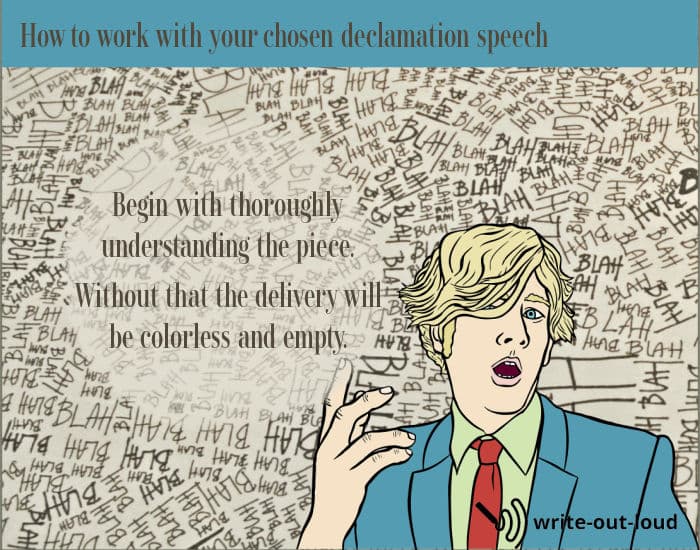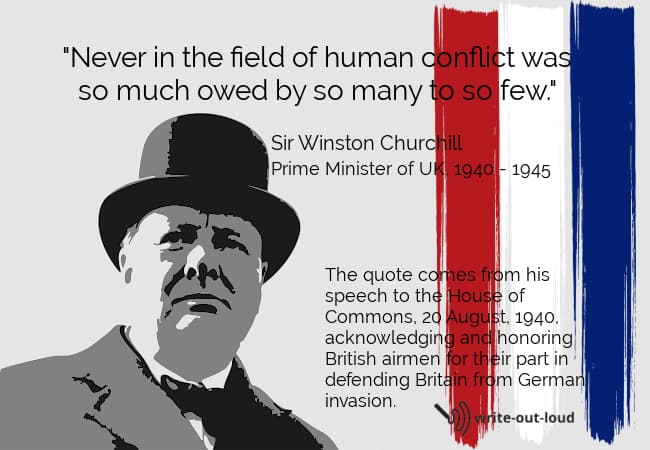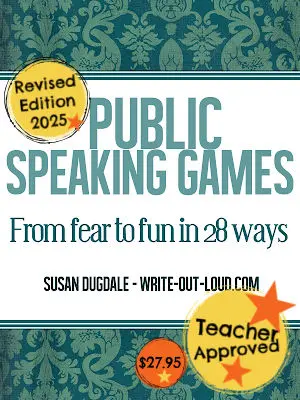- HOME ›
- Declamation speech resources
Declamation speech resources
How to choose, understand & deliver a declamation speech well
By: Susan Dugdale
A declamation speech is the term used to describe the re-giving of an important or famous speech.
It could be a political, graduation or commencement speech, a eulogy, a sermon: any type of speech at all as long as it's one that had significant impact on those who heard it.
But what's their purpose? How do you choose a good piece? Where do you look for one? And how do you work with it?
The answers to those questions are here.
What's on this page:
- the purpose of a declamation speech, and its origins
- how to choose a piece - guidelines to follow
- where to look for a piece, links to collections of notable speeches
- how to work with a piece: step by step guidelines covering interpretation, delivery and rehearsal
- links to additional declamation resources
- a definition of declamation as it's used in the phrase 'declamation speech'
The purpose of a declamation speech
The speaker's task is to re-interpret the original, reproducing its power afresh.
Often this exercise will be set as part of studying public speaking skills. The purpose is to have the student directly experience the power of masterfully crafted language. Through their interpretation of the speech, the techniques and skills of the original orator are learned.
Declamation speech origins
This method of teaching was used in ancient Greece where public speaking was considered a necessary art for anybody embarking on a career in public service.

A declamation was a practice piece set by a teacher for exactly the same reason they are set now: to have a student learn the skills of combining eloquent language with equally eloquent delivery in order to argue or persuade.
The great 4th century Greek orator Demosthenes is said to have honed his craft through studying the speeches of the great orators who preceded him.
Choosing a declamation speech
The speech you choose to learn is critical.
Firstly, you must like it. There's no good to be gained from choosing something because you think it will please or impress your teacher and likewise, judges. You're going to work on this piece to make it your own. Therefore, it needs to genuinely reflect you in theme and message.
And secondly it needs a combination of the qualities listed in the following areas:
- Style of language: Elevated, inspirational, elegant, poetic, masterful - the speech should be an example of 'beautiful' language and construction.
- Structure: Look for unity of purpose. The piece needs to be structurally coherent - have a beginning, development and close. It is not a loose ramble or collection of impressions without form.
- Theme: The message or theme running through it should be worthy of its oratorical treatment, i.e., the style of language specified above. It must be important and applicable beyond the time it was first delivered. For example, Martin Luther King's 'I had a dream' speech has carried its theme down the years without any loss of potency or relevance.
(But be warned - choose carefully. A famous speech such as King's 'I had a dream' will have been heard and heard again. You need something of similar impact but with considerably less profile.) - Impact: The speech must have reached and grabbed the hearts and minds of its listeners. It will have persuasively challenged and changed the way people thought and acted, uniting and inspiring them toward a common goal or course of action.
If you're choosing for a competition before you make your choice be sure to review the guidelines and do take note of the allocated time. Be prepared to cut your selection to fit.
Search for a declamation piece
Looking for just the right extract takes time. The links below are a good starting point.
Other avenues worth exploring are archives of previous declamation competition winners, asking for help from your teachers, or librarians, experimenting with search words: eulogies, motivational or persuasive speeches, civil rights speeches...
Keep going until you find something you know you'll feel wholehearted about.
Famous speeches from African Americans
- African American History: Major Speeches
- Say It Plain - American Radio Works -A century of great African American speeches
- Notable Speeches and Letters by African Americans from Benjamin Banneker to Barack Obama
Famous American speeches
Famous speeches - world wide
Famous speeches by women

Listen and watch: famous speeches
Understanding your declamation piece

- Make getting to know your piece your top priority
If you learn or memorize the text of the speech without understanding it your delivery will become an ultimate blah-blah-blah talking head presentation.
Find out about the original context of the speech
What was the occasion the speech was written for? What period of time was it? What was happening in society generally?
Who was the audience? Why had they come along to hear the speaker?
What did they need or expect from the speech?
Find out about the person who originally gave the speech
Who was he or, she?
What passions drove them? Did they write the speech themselves?
What did they want from the speech? (Was there a specific purpose or goal?)
What delivery characteristics did they use? Any particular habits?
What does this speech mean to you?
Can you put what is being said into your own words?
The more you dig into the meaning of the piece, emotionally and intellectually, the more able you'll be to convey it convincingly.
Print the speech in a clear font and double spaced
You will use the gaps to write yourself notes and mark it up for delivery. For example, putting in the pauses, or breath points, the places to soften your voice, increase the volume or, for movement.
Make several copies. You are going to need them. ☺
Listen to the original speaker
If you can, listen to original speech while reading your copy.
Note how the speaker is using their voice. What qualities are you hearing? Do they change for different portions of the speech? Why? Can you hear a beat or rhythm? What effect does that have?
Listen until you can clearly identify changes in tone, pitch, and pace, and know why it's being done.
The goal of delivering a declamation speech well

The goal is not to impersonate, or mimic, the original speech maker.
For example, if you are working with one of Winston Churchill's war time speeches* you don't have to 'become' him, in the same way an actor would if he was playing him in a play or a film
However you do have to find and sincerely draw out the qualities of the speech making it memorable. That, is your goal.
*To see the full text of the speech the quote is drawn from, and much, much more about Winston Churchill, visit: The Few, 1940.
Rehearsing your speech
Along with choosing an appropriate piece, and understanding it, thorough and regular practice is what will distinguish what you do from everyone else.
If you're serious about performing well, check these links.

Begin with these full guidelines on how to rehearse. You'll find an easily followed step by step process, with detours into other areas should you need them:
- vocal variety to bring color and interest into your voice
- help to use pause and pace effectively, as well as,
- diction exercises to clear up any sloppy pronunciation issues
Extra Declamation Speech Resources
Declamation Competitions
This is a Wikipedia page with ongoing links to the National Catholic Forensic League and the Theodore Gibson Oratorical Project.
And here's a link to a set of excellent resources from forensicscommunity.com.
There is a wealth of information here: guides, a forum and links to videos. It's a must-look site if you're serious about performing to the best of your ability.
The definition of Declamation
Declamation is the action or art of declaiming; the repeating or uttering of a speech, etc. with studied intonation and gesture.
- A public speech or address of rhetorical character; a set speech in rhetorical elocution.
- Declaiming or speaking in an impassioned oratorical manner; fervid denunciation with appeals to the audience.
- A speech of a rhetorical kind expressing strong feeling and addressed to the passions of the hearers; a declamatory speech, a harangue.
- Renunciation, repudiation, disclaimer.
For more see the multiple definitions gathered together on one page by thefreedictionary.com/declamation


About the Author: Susan Dugdale, founder of write-out-loud.com, is a qualified teacher of English and drama with over 40 years of experience. Drawing on her professional expertise and her personal journey from shyness to confidence, Susan creates practical, real-world resources to help people find their voice and speak with power.




